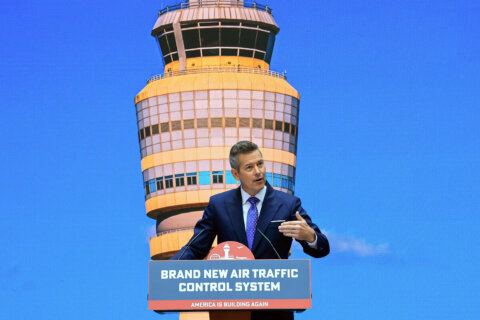A new study finds that the roads, and the traffic, in Northern Virginia are costing drivers nearly $2,600 a year apiece, and each driver sits in traffic for an average of 102 hours a year — and the money to fix the problems may be drying up for an unintended reason.
“That’s the cost of all the time lost due to being stuck in traffic congestion, the extra costs of maintaining a vehicle on rough roads which is beating up vehicles, and also the cost of traffic crashes — at least, looking at the economic cost,” said Rocky Moretti, director of policy and research at TRIP, the nonprofit which released the study Monday.
Statewide, the roads cost Virginia drivers a total of $9.5 billion per year.
If you thought the roads in Northern Virginia were getting more crowded, the study says you’re right — travel on Virginia’s roads has gone up by 14% between 2000 and 2018, and 6% between 2013 and 2018. And in Northern Virginia, the lost time and fuel is the biggest culprit, costing the average motorist 102 hours a year and an estimated $2,015.
The study found that about 16% of major roads in Northern Virginia maintained by the state and localities are in what TRIP described as poor condition, with 27% in mediocre condition. That’s higher than the statewide rate of 12% in poor condition and 22% mediocre. And more than 600 bridges statewide are rated poor or structurally deficient.
Since gas taxes are a major component of transportation funding in Virginia, the trend toward fuel efficiency and electric vehicles is set to take a bite out of the money needed to fix the situation, the study found.
According to the report, the fuel efficiency of cars on Virginia roads is expected to increase by 51% over the next 20 years. And while only 2% of drivers currently use electric cars in the state, that is expected to increase to 46% during the same time frame.
Between the two factors, the study found, the consumption of gasoline and diesel is expected to go down by 23% by 2030 and 51% by 2040. In turn, state motor fuel tax receipts will go down by a projected 34% by 2030 and 62% by 2040 — 24% by 2030 and 50% by 2040 for diesel tax receipts.
(The process is already underway, the study found — vehicle miles of travel went up by 3.2% between 2016 and 2018, the Virginia transportation secretary’s office reported, while fuel tax collections went down 0.4 percent.)
“Conditions in terms of traffic congestion and pavement conditions in northern Virginia area and statewide are likely to get worse, unless Virginia can identify a sustainable long term source of funding,” Moretti said.
The study also found that 3,875 people died on Virginia roads between 2014 and 2018, and average of 775 a year. The numbers are going up — from 703 in 2014 to 820 in 2018 — though the rate of fatalities statewide in 2018 — 0.96 per 100 million miles of travel — was lower than the national average.
Moretti said the organization does not tell states how to respond to funding problems, which he said other states are also experiencing.
He said some states have increased gas taxes, put fees on registering electric vehicles and added user fees based on how much a motorist uses the roads.
The bottom line, according to the report, is that improving and maintaining roads in the state cannot come without a substantial boost in local, state or federal transportation funding.
The report collected information from the Virginia Department of Transportation, the Federal Highway Administration, the American Association of State Highway and Transportation Officials, the Bureau of Transportation Statistics, the U.S. Census Bureau, the Texas Transportation Institute, the American Road & Transportation Builders Association and the National Highway Traffic Safety Administration.
WTOP’s Mike Murillo contributed to this report.








